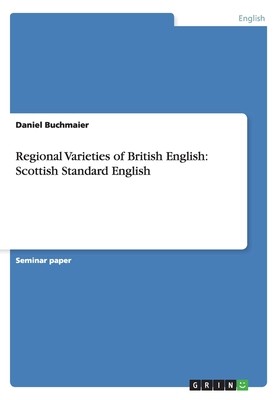
- Išsiųsime per 10–14 d.d.
- Autorius: Daniel Buchmaier
- Leidėjas: GRIN Verlag
- ISBN-10: 3656080070
- ISBN-13: 9783656080077
- Formatas: 17.8 x 25.4 x 0.1 cm, minkšti viršeliai
- Kalba: Anglų
- Extra -15 % nuolaida šiai knygai su kodu: ENG15
Atsiliepimai
Aprašymas
Seminar paper from the year 2010 in the subject English Language and Literature Studies - Linguistics, grade: 2,0, University of Tubingen (Englisches Seminar), course: Englisch Grammar: Phonetics, language: English, abstract: 1. Introduction It's a braw bricht muin-licht nicht the nicht. (literally: It's a beautiful bright moonlight night tonight.) Kiddingly, Scottish people love to let English people try to pronounce this sentence from Scots. For English people it is hard to pronounce the Scottish sentence since it contains the /x/-phoneme that English Standard English does not know. Therefore Scots is in the eyes of English Standard English Speakers a quite foreign language. But what happens when the two languages - English Standard English and Scots - merge and make up a new language, namely Scottish Standard English? When did the influence of English on Scots start? How much of the language heritage from Scots was imported into SSE? Which special features in phonetic, grammar and lexis can be found? What other languages influenced SSE and which so-called loanwords can still be found? This term paper will try to give answers to these questions. Therefore in (2.) will be given a definition of SSE in contrast to Scots. Then there will be given a rough overview of the historical background and development of SSE (3). Afterwards, certain differences of SSE and English Standard English in phonetic (4.1), grammar (4.2) and lexis (4.3) will be described. Then there shall be given an insight in SSE nowadays (5). 2.EXTRA 15 % nuolaida su kodu: ENG15
Akcija baigiasi už 1d.22:12:33
Nuolaidos kodas galioja perkant nuo 10 €. Nuolaidos nesumuojamos.

- Autorius: Daniel Buchmaier
- Leidėjas: GRIN Verlag
- ISBN-10: 3656080070
- ISBN-13: 9783656080077
- Formatas: 17.8 x 25.4 x 0.1 cm, minkšti viršeliai
- Kalba: Anglų




Atsiliepimai